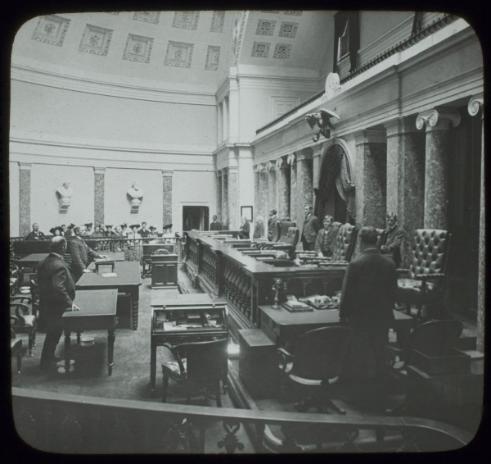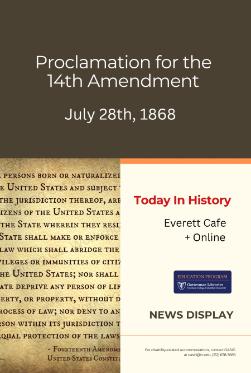Today in History: Proclamation for the 14th Amendment

On July 9, 1868, the Fourteenth Amendment to the U.S. Constitution was ratified by a number of states, but it was not until July 28th, 1868 that Secretary of State William Seward, former governor of New York, issued a proclamation certifying that this change was indeed, unequivocally law. The Fourteenth Amendment granted citizenship to “all persons born or naturalized in the United States,” including former slaves who were recently freed. It also forbade states from denying any person "life, liberty or property, without due process of law" or to "deny to any person within its jurisdiction the equal protection of the laws.” It would serve an important function in the civil rights movement, with regard to the fight for desegregation and equal rights for schooling among American citizens.
The questioning of birthright citizenship began at least 15 years ago and continues to fuel the debate over immigration, with deep political divides over the status of undocumented immigrants, border security, and interpretations of the economic and social impacts upon American culture and public opinion.
The following articles are drawn from Proquest Historical Newspapers, which informs and inspires classroom teaching and learning.
- Reconstruction: Ratification of the Fourteenth Amendment: A Proclamation. (1868, Jul 20). New - York Tribune (1866-1899)
- Washington: The Electoral College Bill Vetoed by the President. The Bill Passed in Both Houses over the Veto. (1868, Jul 21). Chicago Tribune (1860-1872)
- Another Proclamation: The President Declares the Fourteenth Amendment Ratified by Alabama. (1868, Jul 23). New York Times (1857-1922)
- The Fourteenth Amendment. (1868, Jul 31). New York Times (1857-1922)
- Equal Education. (1948, Jan 15). The Washington Post (1923-1954)
- Griffin, G. (1953, Dec 08). Attack on Segregation Opened in High Court: Violation of Fourteenth Amendment Is Charged; 'Separate But Equal' View Defended. The Sun (1837-)
- History in the Making: A Summary of World News: Domestic Affairs No Racial Schools. (1954, May 23). New York Herald Tribune (1926-1962)
- Text of Segregation 'Declaration'. (1956, Mar 12). The Sun (1837-)
- Lehmann-Haupt, C. (1976, Feb 04). Books: History of Black Struggle. The Sun (1837-)
- McDonnell, P.J. (1997, Jul 04). A Renewed Debate in Red, White and Blue: Citizenship: As Number of Applicants Surges, Nation's Definition of itself Is Tested. Los Angeles Times (1996-)
- Rocheleau, M. (2010, Jun 02). Will US Revoke the Right of American Citizenship to Foreigners Born Here?: A Bill in the House of Representatives Would Change the 14th Amendment to the US Constitution That Grants Anyone Who Is Born on US Soil the Right of American Citizenship. Efforts to Revoke Birthright Citizenship Could Make It the New Flashpoint in the Debate Over Immigration. The Christian Science Monitor (1908-)

Tips:
- Glidden, William B. Congress and the Fourteenth Amendment : Enforcing Liberty and Equality in the States. Lanham: Lexington Books, 2013. e-book.
- Graham, Howard Jay. Everyman’s Constitution : Historical Essays on the Fourteenth Amendment, the “Conspiracy Theory,” and American Constitutionalism. [Madison, Wisconsin]: State Historical Society of Wisconsin, 1968. e-book.
- Magliocca, Gerard N., and John Armor Bingham. American Founding Son : John Bingham and the Invention of the Fourteenth Amendment. New York: New York University Press, 2013. e-book.
- Perry, Michael J. We the People : The Fourteenth Amendment and the Supreme Court. Oxford, England: Oxford University Press, 1999. e-book.
- Reilly, Elizabeth, ed. Infinite Hope and Finite Disappointment : The Story of the First Interpreters of the Fourteenth Amendment. Akron, Ohio: The University of Akron Press, 2011. e-book.
- 14th Amendment to the U.S. Constitution: Primary Documents in American History. Research Guide, Library of Congress.
Images:
- Supreme Court Room in Washington D.C., 1930, from the Rothman Lantern Slide Collection, Courtesy of Teachers College, Columbia University.
- Excerpt from the 14th Amendment, Canva.
Need to keep current, look to the past, teach a topic? The Everett Cafe features daily postings of news from around the world, and also promotes awareness of historical events from an educational context. Be sure to check additional Cafe News postings on the library blog.

